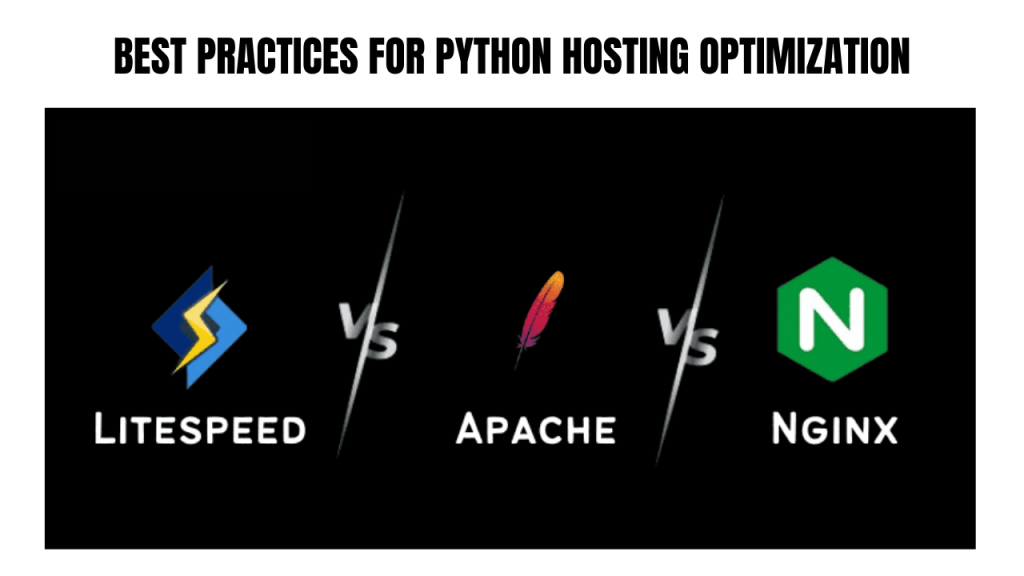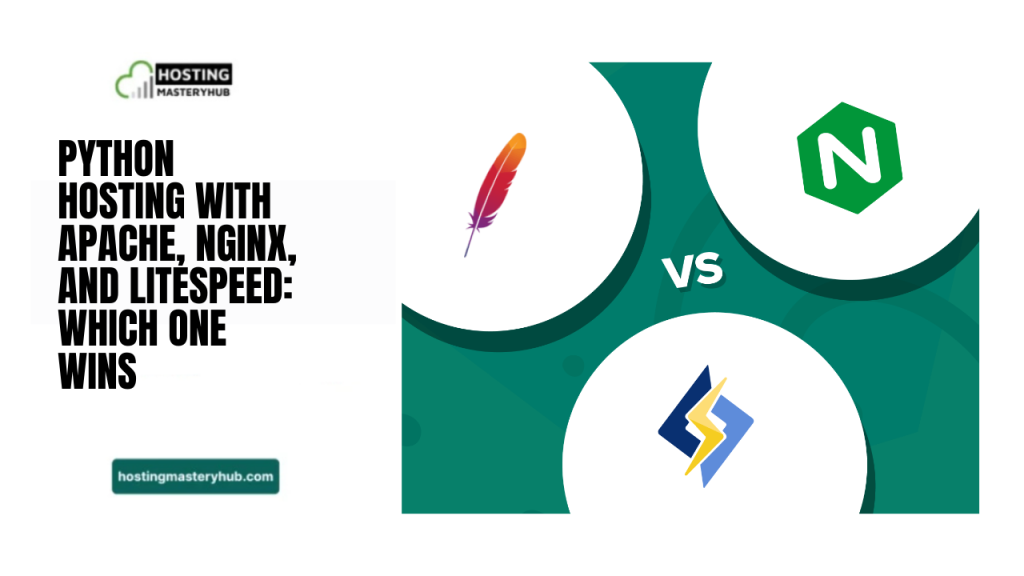Introduction
Hey there! If you’re diving into Python hosting, you’re in for a fun ride. Choosing the right Python web hosting can significantly impact how smoothly your website runs and how satisfied your visitors are.
With numerous options such as Apache, NGINX, and Lite Speed, it’s easy to feel overwhelmed.
What is Python Hosting and Why It Matters
Python hosting is basically a web hosting service that supports Python applications. It’s super important because not all hosts can run Python smoothly. Selecting the right one ensures your app runs faster and remains reliable.
Understanding Python Web Hosting
Python web hosting enables your Python code to reside online, allowing people to access your website or app. It differs from regular hosting in that it supports frameworks such as Django or Flask. A good web host Python ensures your app communicates with the server efficiently.
Shared hosting means sharing server space with others. It’s cheap but can slow down if traffic spikes. VPS hosting provides a virtual space dedicated solely to your site, offering increased speed and control.
Dedicated hosting gives you a whole server. It’s pricey but perfect for high-traffic Python apps.
How Hosting Choice Impacts Website Performance
Your hosting choice affects speed uptime and user experience. Slow Python web hosting can frustrate visitors and negatively impact SEO. Fast reliable hosting keeps people happy and coming back. Even small decisions such as server location caching and Python version, can have a significant impact.
Apache for Python Hosting
Apache is one of the oldest and most trusted servers for Python hosting. It’s flexible, reliable, and works with many Python frameworks. It supports Python web hosting through modules like mod_wsgi, allowing your Python apps to communicate with the server easily.
Key Features and Advantages
Apache is known for its stability and security. It can handle high traffic and multiple applications at once. Its flexibility makes it a solid choice for Python web hosting setups.
Other perks include detailed logging, URL rewriting, and easy integration with databases. These features make managing Python hosting apps simpler and more reliable.
Setting Up Python with Apache Using mod_wsgi
To run Python apps on Apache, you use mod_wsgi. It seamlessly connects your Python application to the Apache server. This setup makes your Python web hosting efficient, ensuring requests are handled quickly.
With proper configuration, Apache can serve multiple Python apps without crashing.
Performance Optimization Tips
You can speed up Apache by enabling caching, compressing files, and using the latest Python version. Optimized code, combined with intelligent hosting, equals fast Python hosting.
Additionally, limiting unused modules and monitoring server performance ensures your web host’s Python environment runs smoothly, even under heavy traffic.
Common Issues and How to Fix Them
Some common Apache issues include slow response, misconfigured modules, or WSGI errors. Fixing them often means tweaking configurations or updating software.
Using a reliable Python web hosting provider helps prevent most problems.
NGINX for Python Hosting
NGINX is renowned for its speed and ability to handle high traffic. It’s perfect for modern Python hosting needs, especially for busy websites. It works beautifully with Python web hosting frameworks like Django and Flask, making it a favorite among developers who need performance and scalability.
Why NGINX is Popular for Python Applications
- NGINX uses less memory than Apache, making web hosting with Python faster and more efficient.
- It can handle multiple requests simultaneously, making it ideal for busy websites.
- Reverse proxy and load balancing features make it suitable for large Python applications.
- Many developers choose NGINX for Python hosting because it’s lightweight and reliable.
Configuring NGINX with uWSGI or Gunicorn
NGINX works best with uWSGI or Gunicorn to serve Python apps. This setup ensures requests reach your app quickly and efficiently. A proper Python web hosting setup here enhances speed, minimizes downtime, and ensures your app remains responsive.
Load Balancing and Reverse Proxy Setup
NGINX can distribute traffic across multiple servers using load balancing. This keeps your Python hosting fast, even during periods of high traffic. Using it as a reverse proxy also adds security and hides your app server. A smart Python web hosting setup can handle big audiences without breaking a sweat.
Security Enhancements with NGINX
NGINX allows SSL, rate limiting, and request filtering, boosting security for Python hosting. This protects your apps and data from threats. A secure Python web hosting environment means users trust your site and your app runs safely.
How to Choose the Best Web Server for Your Python Project
Picking the correct web server is a game-changer for Python hosting. Your choice affects speed, stability, and the amount of traffic your app can handle. For small projects, simplicity matters more than raw power, while larger apps need servers that can handle multiple requests without slowing down.
Considerations for Small vs Large Applications
Small apps can thrive on shared Python web hosting. They don’t need enormous resources, so you can save money while still getting a reliable setup. These setups work well for personal blogs, small business websites, or hobby projects.
For larger applications, the story changes. You’ll want a server like NGINX or LiteSpeed with more memory, CPU power, and caching options.
Hosting Cost vs Performance Trade-offs
Budget is always a factor when picking python web hosting. Cheaper servers may be tempting, but they often come with limitations in terms of speed, features, and support. Spending a bit more often leads to better performance and reliability.
Performance impacts everything from page load speed to user experience.
Recommended Setup for High-Traffic Python Websites
High-traffic apps need more than just a good server. Pairing NGINX or Lite Speed with uWSGI or Gunicorn ensures your Python apps respond quickly to requests. This setup is perfect for busy websites or e-commerce platforms.

Best Practices for Python Hosting Optimization
Optimizing Python hosting is all about speed, reliability, and efficiency. Keep your code clean, enable caching, and configure your server for peak performance. These steps enable your web host’s Python handling to support more users without lag.
Regular monitoring helps spot slow queries or memory issues.
Efficient WSGI Configuration
WSGI servers, such as Gunicorn or uWSGI, connect your Python app to the web server. A properly configured WSGI setup ensures your python web hosting is fast and reliable. Tuning workers, threads, and timeouts improves request handling.
Database Connection Optimization
Database performance affects your app’s speed. Using connection pooling and optimizing queries helps your python web hosting run efficiently. Slow queries or excessive database calls can cause bottlenecks in your app. A strong web host python ensures your database interactions are fast and reliable.
Caching Strategies and CDN Integration
- Caching static files and content reduces server load and speeds up page delivery.
- Using a CDN ensures your python web hosting reaches users faster worldwide.
- A reliable web host, combined with Python and caching, improves page load times and reduces server stress during high traffic.
- Even small apps benefit from caching strategies.
- For large apps, caching is essential to maintain performance.
Security Best Practices for Python Applications
Security is critical for any Python hosting setup. Use SSL certificates, firewalls, and rate limiting to protect your site and users. Regular updates and monitoring prevent vulnerabilities. A secure web host python keeps your apps safe from attacks and builds user trust.
Conclusion
Choosing the correct server for Python hosting affects speed, stability, and user experience. Apache NGINX and Lite Speed each have unique strengths depending on your project needs. Optimized python web hosting setups handle traffic efficiently, boost SEO, and keep users happy.
FAQs
What is the most efficient web server for Python hosting?
NGINX is fast and lightweight, making it ideal for most applications. Lite Speed can also shine for high-traffic sites.
Can Python applications run on all three servers without modification?
Yes, but minor configuration tweaks are often needed for optimal performance.
How does server choice affect website loading speed?
Servers like NGINX or Lite Speed handle multiple requests efficiently, speeding up your python web hosting.
Which server is best for high-traffic Python websites?
NGINX or Lite Speed with caching and load balancing is usually the top choice.
Are there cost differences between Apache, NGINX, and Lite Speed?
Apache and NGINX are free, while Lite Speed often requires a paid license for advanced features.
Latest post:
- How to Find a Secure E-commerce Hosting Provider for Your Business
- Best Online Shop Hosting Options for Startups and Growing Stores
- Top E-commerce Web Hosting Companies to Watch in 2025
- Best Hosting Plans for E-commerce Websites: How to Choose the Perfect Fit
- Comparing Black Friday Hosting Deals 2018 to 2025: Pricing Trends & Features
